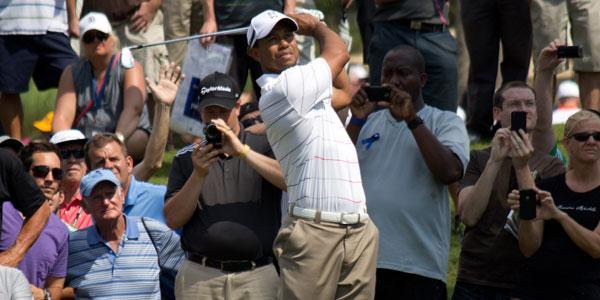
Playing In Bad Conditions
Have you ever uttered any of the following sentiments, “I never golf well after rain delays,” “Bad weather always messes up my game,” or “I can’t putt on damp greens?” Rain delays and bad weather are external factors that can have a profound effect on golfers’ confidence and scores.
Poor playing conditions, such as wind, rain, and unfavorable course conditions, can distract a golfer from their game and increase doubts. Rain delays can create a vast amount of time for golfers to “remain in their head” and over-think their game. The ability to be flexible during rain delays is critical for playing consistent golf.
The 2013 Presidents Cup experienced multiple rain delays prompting officials to start the closing singles session three hours ahead of schedule in hopes of finishing the competition on Sunday. Despite a 90-minute delay Thursday, a 2-hour, 34-minute delay Friday and another 76-minute delay on Saturday due to inclement weather, the U.S. beat the Internationals, 18 ½- 15 ½ to gain their 5th straight President’s Cup victory.
Strong Mindset
What factors helped the U.S. team secure another Cup victory? The U.S. team was extremely talented and strongly favored to win match play against the International team that fielded seven rookies on their squad. Of course, the most talented and experienced players don’t always win.
There are countless examples where higher-ranked players are beaten because they took victory for granted and didn’t play to the level of their ability. The U.S. team had something else besides talent and experience… it was composure, a calmness.
Tiger Woods earned four points for the U.S. team, the most points scored by any player. He talked about the stress of the tournament. “It’s been a long week for all of us. I think that a few of us are a little bit dinged up and our physios did a hell of a job this week of getting us out there and keeping us going. And especially with all of the start and stops … I’m a little bit sore, and certainly I’m looking forward to not touching a club for a while.”
The unspoken pearl of wisdom in Wood’s statement has to do with the ability to “relax” despite the pressure of a multi-day tournament. The tournament was filled with tough playing conditions: wind, torrential downpours and rain delays but the U.S. seemed at ease during the tournament even playing with a squirrel on the first day and nicknaming their mascot, “Sammy.” Their opponents were focused on trying to reverse their fortune and beat the U.S. team for the first time since 1998.
Bad playing conditions can throw you off your game, if you let them. Keep in mind that everyone in the field plays in the same conditions. The golfers who can cope with the adverse conditions will succeed. If you find yourself in a rain delay, use extra time to take brief “mental breaks” (stretching, listening to music) then re-focus on your game when it is time to re-engage play. This will help you take your mind off the competition and perform well when play resumes.
Related Sports Psychology Articles
- Mindset for Playing in Tough Conditions
- The Mindset for Playing in Tough Conditions
- Bad Weather Doesn’t Derail US President’s Cup Team
*Subscribe to The Sports Psychology Podcast on iTunes
*Subscribe to The Sports Psychology Podcast on Spotify
Download a free sports psychology report to improve your mental game!
Learn more about our one-on-one mental game coaching.
Golfer’s Mental Edge

What’s the big sign that your mental game is the weak link in your golf game? When you can’t play consistently as well as when you play a practice or casual round–or your range game is way better than your game on the course. If you suffer from lack of focus, low self-confidence, poor composure or other mental game obstacles on the course, you can’t reach your true potential in golf.
The Golfer’s Mental Edge 2.0 Audio and Workbook program is ideal for any amateur, collegiate, junior, and tour professional golfer.
Golf coaches and instructors would also be wise to teach “The Golfer’s Mental Edge 2.0” principles to their players. This program is perfect for any golfer who wants to improve performance and consistency by managing their mind better on the course.
